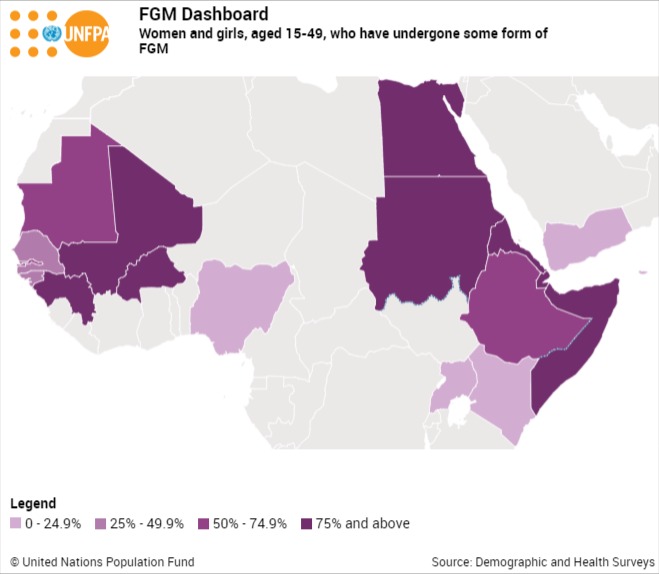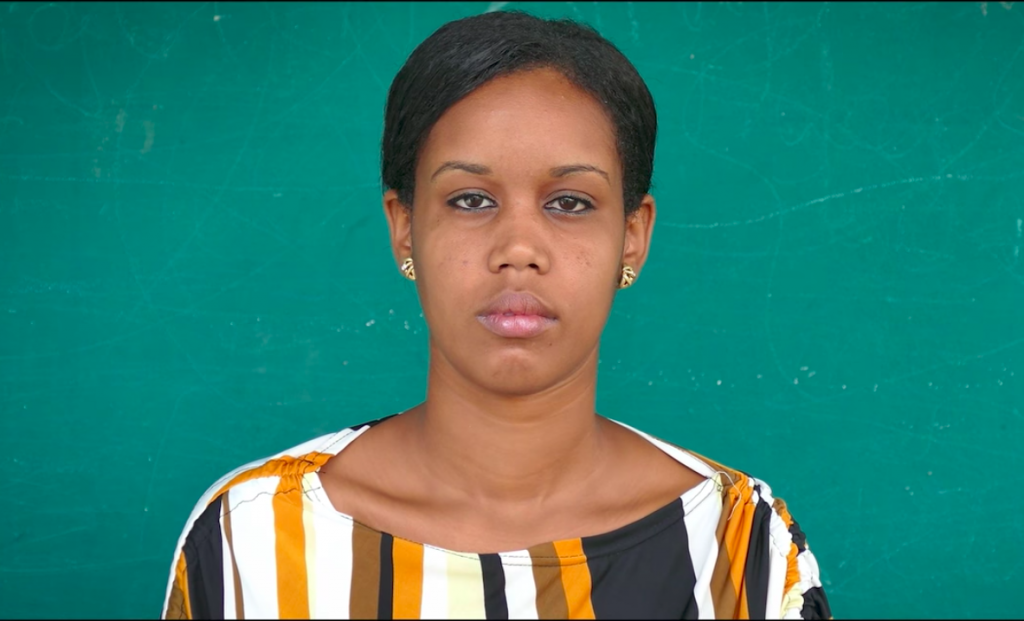No matter where we live in, gender equality is a fundamental human right and a key element to advance in all areas of our societies.
But inequalities faced by girls and women persist everywhere and cause global progress to stagnate. This is why United Nations SDG 5 advocates to end all forms of discrimination and violence against all women worldwide and to eliminate all harmful practices such as Female Genital Mutilation (FGM).
FGM is one of the worst human rights violations that even today thousands of women suffer around the world and it is internationally recognized as an extreme violation of the rights of women and girls.
This practice remains widespread and violates the principles of equality and non-discrimination on the basis of sex, the right to freedom from torture or cruel, inhumane or degrading punishment, the right to the highest standard of health, the rights of the child, the right to the physical and mental integrity and the right to life.
The United Nations (UN) estimates that a total of 200 million girls and women alive nowadays have experienced some kind of FGM and that if current trends continue, the number of cut girls will increase significantly in the next years. In Africa, more than three million girls have been estimated to be at risk for FGM annually. The practice is carried out on young girls sometime between infancy and age 15 and sometimes on adult women.
Although FGM is mainly concentrated in 29 countries in Africa and the Middle East, this practice is also pursued in some countries in Asia and Latin America. Furthermore, FGM continues to persist amongst immigrant populations living in Western Europe, North America, Australia and New Zealand. In this sense, for many girls around the world, school holidays means “cutting season” and in some cases, families travel with their daughters abroad (also from the US or the EU) to have this done.
FGM refers to all forms of partial or total removal of external female genitalia or other injuries to female genital organs for non-medical reasons and it is practised in many countries due to social and cultural norms that reflect gender inequality. It is a human rights violation that is still widespread for many reasons.

In the photo: Map showing the prevalence of FGM. Photo Credit: UNICEF global databases, 2016
In some societies, it is driven by the belief that girls must be cut to control their libido, that intact girls are dirty or ugly, or that it is a transition to adulthood. Those communities consider FGM as a rite of passage, as a prerequisite for marriage and as a religious ceremony.
In many cultures FGM is considered as a significant part of identity and families who do not have their daughters cut may confront condemnation and ostracism, while the women affected are often considered ineligible for marriage.
The practice is frequently carried out by elderly members of the communities (but not exclusively women) that traditionally perform this task or by birth attendants. Moreover, FGM can be carried out by traditional health practitioners, barbers (male), members of secret societies, herbalists or female relatives. And in some cases even by medical professionals (this is referred to as the “medicalisation” of FGM). It should be underlined that those trained health professionals who perform FGM are doing it in violation of women’s right to life and health.
FGM can cause health complications to women and girls, such as chronic pain, infections, anxiety, depression, the increased risk of HIV transmission, infertility, birth complications and deaths. This heinous practice cannot be safe for women and girls even if it is performed by a healthcare professional in a sterile environment.
To eradicate FGM, education is a major and powerful tool to empower girls, women and their communities. Educating girls is one of the best investments: it increases economic opportunities for them and their country. Also, it helps eliminating cultural and traditional practices like FGM and child marriage, that violate girls and women’s human rights.
We can find many significant achievements in the journey on FGM eradication. Yet there is still a lot of work to be done in raising awareness: from collecting data on the procedures that are carried out to educating communities to encourage them to change social norms that violate girls’ and women’s rights.
Outstanding coverage and support of mass media, the advocacy of civil society (including the communities’ leaders), grassroots and international organizations, NGOs, research institutes and other stakeholders at a global, regional and local level and the adoption of effective legislation – all those are imperative to eradicate this inhumane practice.
For instance, in order to call for action to engage communities against this harmful practice, the UN established the “The International Day of Zero Tolerance for Female Genital Mutilation” on February 6. This global initiative is supported with social online tools, e.g. the hashtag #EndFGM and the theme for 2017: “Building a solid and interactive bridge between Africa and the world to accelerate ending FGM by 2030.”
The United Nations Population Fund (UNFPA) and UNICEF lead one of the largest global programmes – The Joint Programme on Female Genital Mutilation/Cutting – to fight against FGM. Its work is focused on 17 African countries and initiatives at the regional and global levels are also supported.
Another great initiative at UN level is the first Resolution (A/RES/67/146) against FGM, adopted by the General Assembly in December 2012, calling the world to intensify global efforts to eliminate the practice. Moreover, in December 2014 the UN General Assembly adopted Resolution A/RES/69/150 calling member-states to develop, support and implement strategies for the prevention of FGM (including training of medical personnel, social workers and community and religious leaders). In 2015, FGM was included in the SDG under target 5.3 calling for the elimination of all harmful practices against women and girls.
Furthermore, the European Commission adopted in November 2013 a “Communication on FGM” titled “Towards the elimination of FGM” (COM (2013) 833), with the objective of eliminating and preventing FGM as well as promoting better support to EU member states in prosecuting this practice more effectively.

In the photo: banner promoting the UN SDGs. Photo credit: UN
Meanwhile, states also need to be on the frontline fighting against FGM, educating communities about FGM and encouraging societies to collectively abandon this practice. Many countries have passed legislation banning this practice and developed national policies to achieve its abandonment. Some states stipulate prison penalties and monetary fines for those who carry out FGM procedures.
Countries where FGM is banned by law:
Africa:
Benin (2003); Burkina Faso (1996); Central African Republic (1996, 2006); Chad (2003); Cote d’Ivoire (1998); Djibouti (1994, 2009); Egypt (2008); Eritrea (2007); Ethiopia (2004); The Gambia (2015); Ghana (1994, 2007); Guinea (1965, 2000); Guinea Bissau (2011); Kenya (2001, 2011); Mauritania (2005); Niger (2003); Nigeria (2015); Senegal (1999); South Africa (2000); Sudan (state of South Kordofan 2008, state of Gedaref 2009); Tanzania (1998); Togo (1998); Uganda (2010); Zambia (2005, 2011)
Others:
Australia (6 out of 8 states between 1994-2006); Austria (2002); Belgium (2000); Canada (1997); Colombia (Resolution No. 001 of 2009 by indigenous authorities); Cyprus (2003); Denmark (2003); France (Penal Code, 1979); Italy (2005); Luxembourg (on mutilations only, not specifically on ‘genital’ mutilation, 2008); New Zealand (1995); Norway (1995); Portugal (2007); Spain (2003); Sweden (1982, 1998); Switzerland (2005, new stricter penal norm in 2012); United Kingdom (1985); United States (1996).
http://www.youtube.com/watch?time_continue=18&v=TS5Z_2vumLA
Bringing an end to this cruel practice is also men’s and boys’ responsibility. Fortunately, there are more and more men and boys speaking out against FGM (for instance, members of the network “Somali Men Against FGM”) but it is imperative to engage more men and boys from societies affected by this practice and from all around the world to fight against FGM.
Let’s not forget the essential advocating role that health workers, including midwives, can perform resisting social pressure in order to protect women’s and girls’ human, health, sexual and reproductive rights.
In conclusion, FGM denies women their fundamental human rights. Life in a peaceful, prosperous and sustainable world will only be possible when all women worldwide achieve their full potential.
EDITOR’S NOTE: THE OPINIONS EXPRESSED HERE BY IMPAKTER.COM COLUMNISTS ARE THEIR OWN, NOT THOSE OF IMPAKTER.COM









